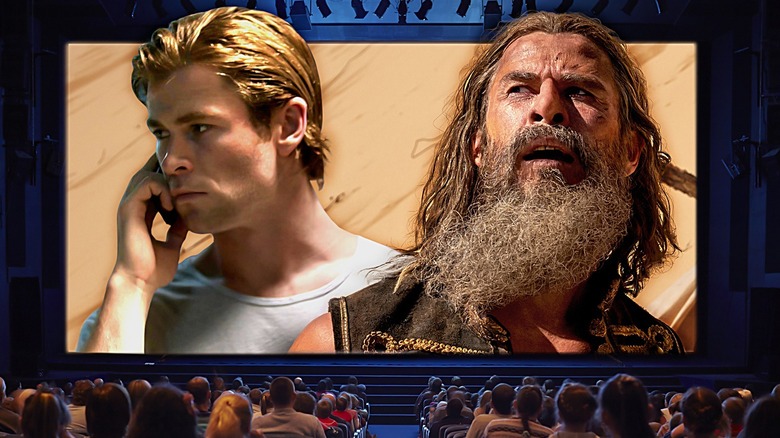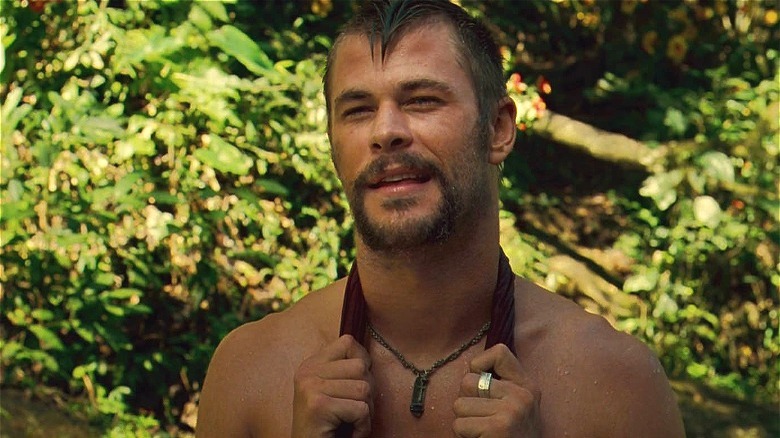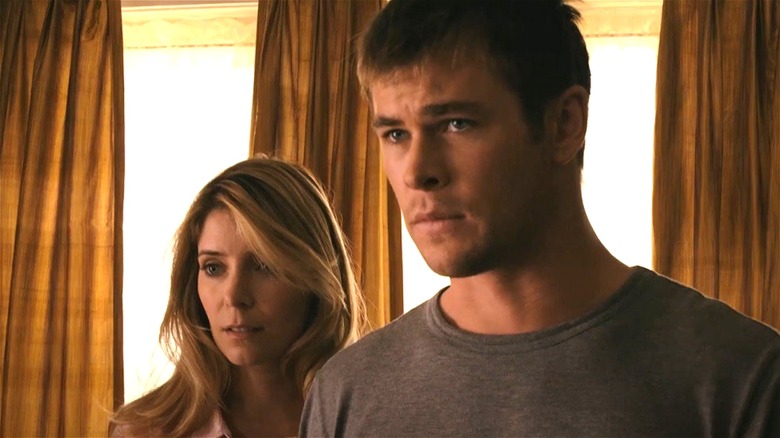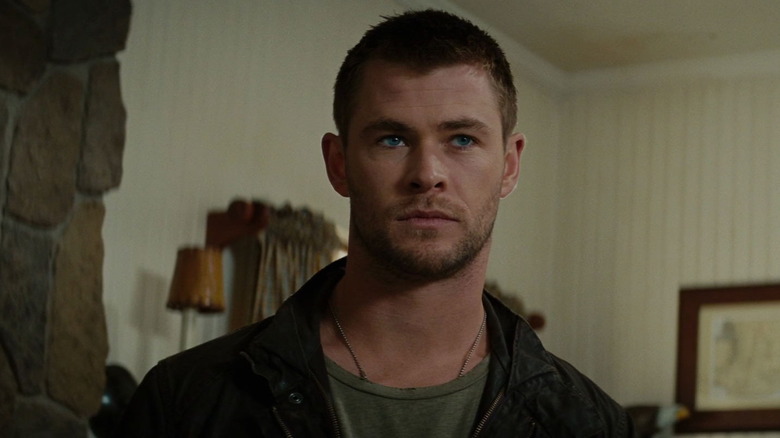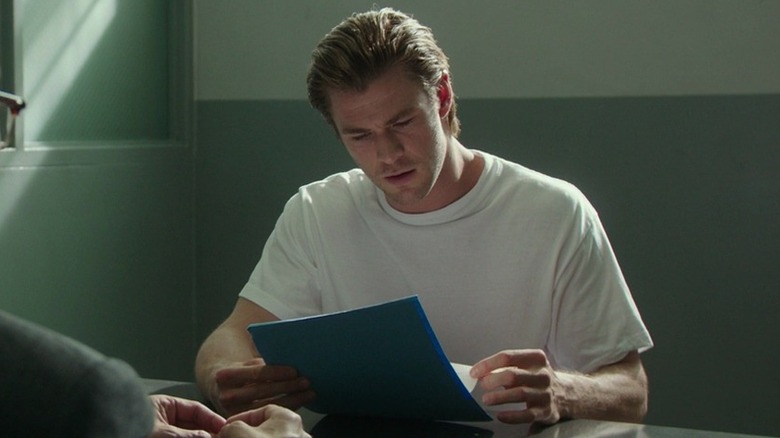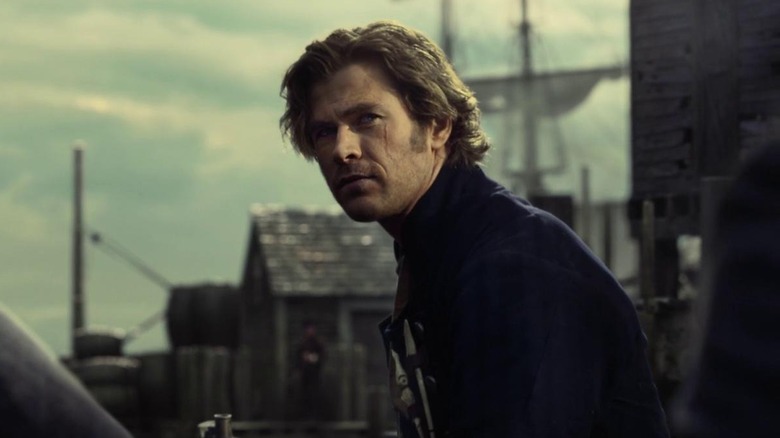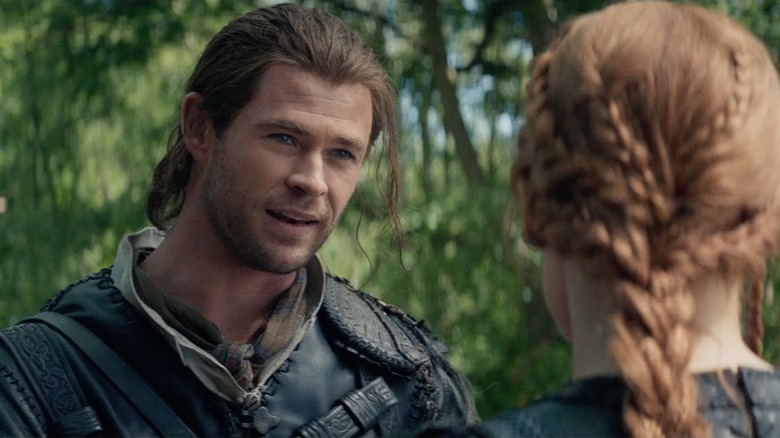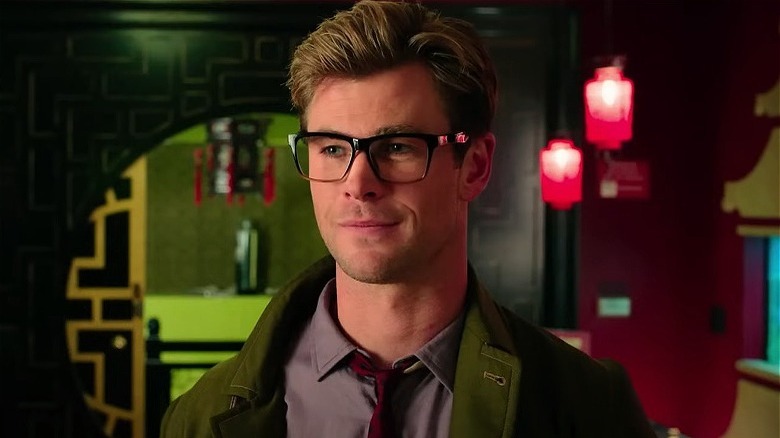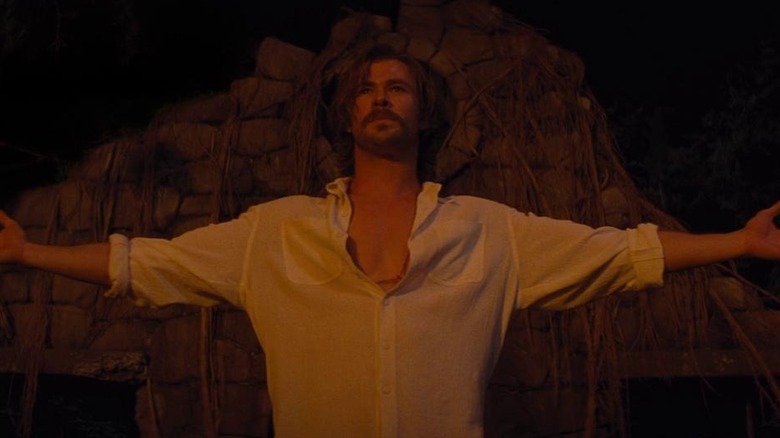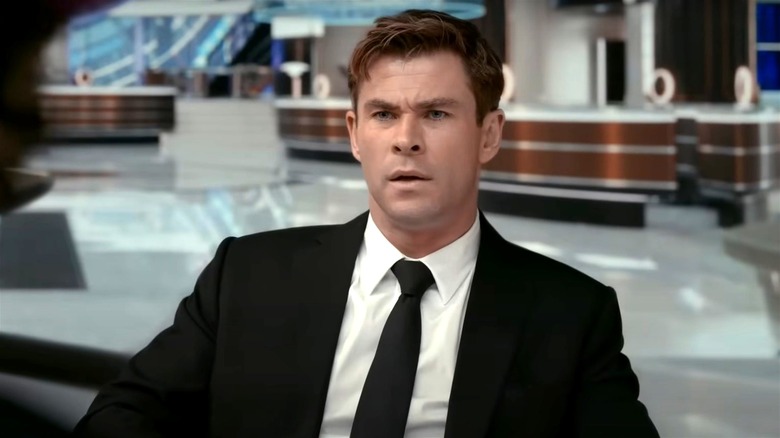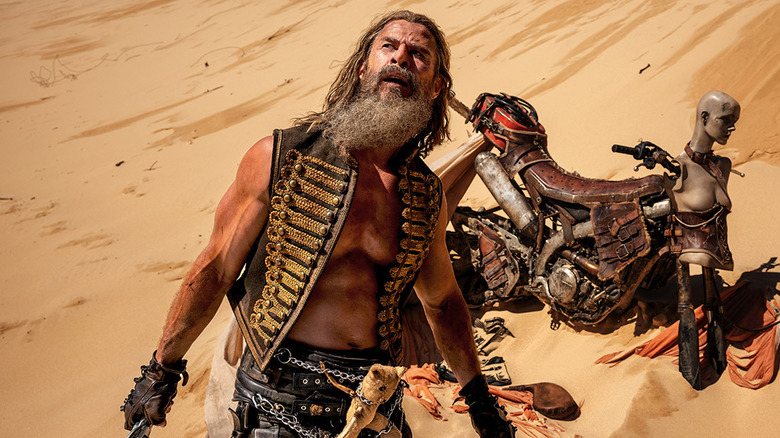Why These Chris Hemsworth Movies Bombed At The Box Office
Domestically, Chris Hemsworth's movies have grossed a combined $4.6 billion. It's a staggering amount, but that number is heavily inflated by his work in the Marvel Cinematic Universe, with his various appearances as the superhero Thor making up about three and a half billion dollars worth of that haul. The $258 million domestic gross of "Star Trek" (in which Hemsworth appears only in the opening scene) makes up another big chunk of the total figure.
Breaking down the numbers like that, one realizes that Chris Hemsworth might not be as much of a bulletproof box office bet as his various Marvel hits might indicate. When you look at his career as a whole, you soon come to realize that the Australian heartthrob has limited box office power when he's not wielding a hammer and fighting alongside a host of other big names. His many flops range wildly in genre and scope, and the reasons that they tanked also vary. Here's why these Chris Hemsworth movies bombed at the box office.
A Perfect Getaway (2009)
The movie world was a very different place in August 2009. For proof, look no further than where Chris Hemsworth's career stood at the time. The Australian actor was still unknown to most American moviegoers, who had only just been cast as Thor a few months earlier. So unknown was Hemsworth that he wasn't even mentioned on posters for "A Perfect Getaway." This David Twohy directorial effort stars Steve Zahn and Milla Jovovich, with Hemsworth playing the role of Kale Garrity, an impetuous man who keeps crossing paths with the film's newlywed protagonists. Initially, he's supposed to be the big foe of the piece. However, various twists and turns reveal a greater evil hiding in plain sight.
"A Perfect Getaway" would only make $22.8 million worldwide, which meant it failed to double a meager $14 million budget. In box office terms, that represents a failure. The feature was such a financial whiff that it would later be referenced as one of the earliest notable box office misfires of one of its financiers, Relativity Media. In just two short years, Hemsworth would leave the days of supporting roles in small-scale thrillers behind. But, back in August 2009, "A Perfect Getaway" was the closest thing anyone had to a "Chris Hemsworth movie." It flopped because word got out that the twist ending wasn't worth the wait. "Twohy seems to think the eventual revelation is clever enough to be worth the price of admission by itself," said The Times. "It isn't."
Ca$h (2010)
Even die-hard Chris Hemsworth fans may scratch their heads at the mention of "Ca$h," which — ironically given its name — made next to nothing at the box office. This 2010 crime thriller was one of the actor's final performances before his career forever changed with the first "Thor" movie in 2011. Directed by Stephen Milburn Anderson, "Ca$h" sees Hemsworth playing a man named Sam Phelan, who stumbles onto a briefcase full of money while driving and decides to keep it. If "No Country for Old Men" taught us anything, it's that nothing good comes from accidentally acquiring a briefcase full of money. This cash leads to Phelan becoming the target of a dangerous psychopath played by Sean Bean, whose twin brother tossed the suitcase during a police chase.
That premise might sound like a standard set-up for a crime thriller, though "Ca$h" had anything but a traditional box office run, even for a financial misfire. The film didn't so much flop at the box office as it did outright flatline: On a $7 million budget, "Ca$h" grossed a shockingly low $46,488. Why? Well, distributor Roadside Attractions never brought the title into more than 43 theaters and it ran for an average of less then two weeks in each of them. With no support from its distributor and no real critical acclaim to speak of, "Ca$h" had no way of standing out to moviegoers. Its financial fate was practically sealed before the first screening started.
Red Dawn (2012)
A "Red Dawn" remake was always going to face an uphill battle at the box office. The original 1984 film was a hit, but its success was intertwined with the Cold War paranoia of the time. Perhaps if it came out today it might have done better given the global climate, but, back in the early 2010s, it was simply a hard sell. It was hampered even more by the financial difficulties of its financier: MGM's bankruptcy sent the project into limbo for years (it was shot in 2009 but sat doing nothing for a number of years).
The film was eventually acquired by FilmDistrict and it hit cineplexes in 2012, which seemed like a good move on paper: Hemsworth was a Marvel superhero at this point and co-star Josh Hutcherson's rep had also grown thanks to "The Hunger Games." However, the presence of these rising stars wasn't enough to ensure success for the remake. Costing $65 million to make, "Red Dawn" only grossed $48 million worldwide. The "Red Dawn" brand name just wasn't strong enough to get people into the theaters.
It didn't help that the feature launched with lackluster marketing, which failed to communicate the necessity of a new "Red Dawn." Competition from fellow November 2012 action movie "Skyfall" also took "Red Dawn" down a peg or two. Going toe-to-toe with James Bond meant that "Red Dawn" would never be a top-tier option for moviegoers craving bullets and explosions that month. To this day, it remains Chris Hemsworth's lowest-rated movie on Rotten Tomatoes.
Blackhat (2015)
Before "Blackhat," director Michael Mann had a relatively solid box office track record to accompany his acclaim as an auteur, with the likes of "Collateral," "The Aviator," "Hancock," and "Public Enemies" all raking in north of $200 million worldwide. Then, after a six-year absence, Mann returned to potentially continue that streak with the January 2015 hacking drama "Blackhat." He was well-known for working with big-name performers like Al Pacino, Johnny Depp, Tom Cruise, and Jamie Foxx at this point. Unfortunately, Hemsworth was still in the early days of his Marvel stint, and having Thor anchor "Blackhat" couldn't save the film from financial disaster.
"Blackhat" made just $19.6 million worldwide, including an abysmal $8 million domestically. On a $70 million budget, that box office haul was downright atrocious. Only two of Mann's previous directorial efforts (both of them made in the 1980s) did worse in North America. An uninspired marketing campaign and the difficulties of making cyber crimes visually compelling to general moviegoers put "Blackhat" at a major disadvantage from the get-go. And, to complicate matters further, Mann's absence from the silver screen hadn't exactly left people praying for his comeback. Rather, the movie world had left him behind.
In the Heart of the Sea (2015)
Just two years after working together on the critically acclaimed racing movie "Rush," director Ron Howard and leading man Chris Hemsworth reunited for "In the Heart of the Sea." This seafaring period piece went into theaters armed with a marketing campaign boasting that it was based on the true story that inspired "Moby-Dick." Relying so heavily on love for the classic Herman Melville novel always seemed like a strange way to lure in modern moviegoers, and "In the Heart of the Sea" was also dealt a fatal release date delay. Originally scheduled for a March 2015 launch, it ultimately dropped on December 11, 2015. This meant that it opened just seven days before "Star Wars: The Force Awakens."
It doesn't take an expert box office analyst to work out that going up against the first Star Wars film in a decade had a negative impact on "In the Heart of the Sea." That was especially true seeing as the picture was banking on IMAX 3D ticket prices to make a profit. Unsurprisingly, "In the Heart of the Sea" grossed a dismal $25 million domestically and $64 million internationally on a $100 million budget. Even beyond its disastrous release date, "In the Heart of the Sea" was always going to be challenged by the fact that seafaring films rarely make bank at the box office if they're not family friendly. When the first wave of poor reviews hit, "In the Heart of the Sea" sank rapidly.
The Huntsman: Winter's War (2016)
The 2012 Kristen Stewart/Chris Hemsworth feature "Snow White & The Huntsman" made a tidy sum at the worldwide box office, raking in over $400 million. It was enough for a sequel to be greenlit, but it took four years to get the follow-up into cineplexes. "The Huntsman: Winter's War" came out in April 2016, but it was missing a key ingredient of its predecessor: Snow White. Kristen Stewart was MIA from this installment, which immediately made "Winter's War" seem superfluous to moviegoers. The lengthy gap between movies didn't help things, either. Any "Huntsman" hype from 2012 had long cooled by 2016.
Still, Universal gave a big marketing push to "Winter's War," which included emphasizing in trailers and TV spots that this was the story that came before Snow White. This attempt to explain why "Winter's War" was missing its predecessor's protagonist was misleading — only part of "Winter's War" is a prequel. This somewhat dishonest strategy only works if a film has a huge opening, but it only made $19 million on its first weekend. Reviews and word of mouth meant people found out that the film was all hype and no substance pretty quickly. In the end, "Winter's War" limped to a $48 million domestic haul. Overseas receipts were more favorable, but the film (which cost $115 million to make) ended up losing money. Analysts suggest that Universal was down by around $30 million after P&A expenses were factored in.
Ghostbusters (2016)
Initially, the box office figures for Paul Feig's 2016 reboot of "Ghostbusters" (which features Chris Hemsworth as ditzy but handsome secretary Kevin Beckman) looked downright terrifying. Grossing $229 million worldwide on a $144 million budget doesn't seem too disastrous on paper, but Sony spent a fortune promoting the movie. "The studio has said break-even would be $300 million," said The Hollywood Reporter at the time. "Now they are preparing for steep losses (think $70 million-plus)." However, in the years following its release, important context emerged surrounding that global haul.
The next two installments in the "Ghostbusters" franchise made just a little over $200 million worldwide, respectively, despite the presence of the original "Ghostbusters" cast members. This means that 2021's "Ghostbusters: Afterlife" and the underwhelming 2024 sequel "Ghostbusters: Frozen Empire" each made less than the 2016 reboot. Considering those financial outcomes, it's clear that modern "Ghostbusters" movies have a firm ceiling in terms of box office haul. There is a fanbase for these movies, it's just not especially massive in franchise terms.
Execs apparently weren't aware of this when they were putting 2016's "Ghostbusters" together. Allocating such a big budget to the reboot meant that its chances of succeeding financially were slim to none. Competition from other big films such as "Finding Dory" and "Star Trek Beyond" certainly didn't help, either. A hysterical Chris Hemsworth playing against type wasn't enough to save "Ghostbusters" from the box office hurdles it faced.
Bad Times at the El Royale (2018)
It's doubtful that Drew Goddard's 2018 feature "Bad Times at the El Royale" (which features Chris Hemsworth as a cult leader in its ensemble cast) would have been a massive success in any timeline, as dark and original R-rated noirs tend to be hard sells for modern moviegoers. Maybe a few more star names added to the mix would have helped — back when the cast was being assembled, the likes of Tom Holland, Russell Crowe, and Beyoncé were reportedly approached for lead roles. They all passed, and, when you consider the film's box office haul, they're probably happy that they did: "Bad Times at the El Royale" was a financial flop, only grossing $31.9 million worldwide on a $32 million budget.
Perhaps execs expected fans of "The Cabin in the Wood" (a previous collaboration between Goddard and Hemsworth) to come out in full force for "Bad Times at the El Royale." The 2011 horror-comedy was a big hit with the critics, scoring an impressive 92% on Rotten Tomatoes. "Bad Times at the El Royale" was also reviewed favorably, but too few people went to see it in cinemas. Why was this the case? Well, a murky, unfocused marketing campaign didn't help, and a lack of genuine A-listers made the movie a hard sell. Also, "Bad Times at the El Royale" went up against the likes of "Venom," "A Star Is Born," and "Halloween," which spelled disaster in terms of box office potential.
Men in Black: International (2019)
In terms of domestic box office, the "Men in Black" franchise peaked with its first installment. Even back when Will Smith and Tommy Lee Jones were starring, "Men in Black II" and "Men in Black 3" failed to come close to the domestic box office haul of the original. The sequels still pulled in a pretty penny, but it was clear these movies were on a downward trajectory in North America. To try and reverse those fortunes, execs shifted the focus onto new characters played by Chris Hemsworth and Tessa Thompson for 2019's "Men in Black: International." The pair reunited after working on the box office hit "Thor: Ragnarok," which proved that they could re-energize a tired franchise. Sadly, new leads weren't enough to get the "Men in Black" franchise back on track.
"Men in Black: International" was the first installment not to make more than $100 million domestically. Sure, its worldwide total was just over $254 million, but even that was less than half of what previous entry "Men in Black 3" amassed globally. Sony Motion Picture Group chairman Tom Rothman told Business Insider that the film ultimately bombed at the box office because the script lacked direction. "I think the truth of the matter is the audience really liked that film and the cast was wonderful, Tessa [Thompson] and Chris [Hemsworth] were great and did a terrific job, but if we made any mistake, I think it probably was that there was not a strong enough idea in the story," Rothman said.
Furiosa: A Mad Max Saga (2024)
The very same things that make "Furiosa: A Mad Max Saga" an artistic triumph also limited its box office potential. Sometimes, a movie's greatest qualities don't line up with what moviegoing audiences actually want. 2015's "Mad Max: Fury Road" ticked all the right boxes, but you can't say the same about the latest installment in George Miller's dystopian universe, in which Chris Hemsworth plays the vile Dementus. While the aesthetics match up, "Furiosa" is radically different to "Fury Road" in several ways. This includes an intimate finale that emphasizes a lengthy dialogue exchange instead of a pulse-racing set piece. Story takes precedence over action, and, as such, there's no big cathartic moment in the movie.
Those qualities, plus other factors (like Hemsworth's go-for-broke performance) led to glowing reviews for "Furiosa," but these same qualities alienated summer moviegoers, who just wanted a rip-roaring good time. As a result, "Furiosa" bombed at the box office. The film bowed to low numbers in North America, posting the worst Memorial Day opening in 30 years. "Its takings make it the lowest box office figures for the holiday weekend since 'Casper' debuted to $22.5 million in 1995," the BBC reported, adding, "'Furiosa' only narrowly beat its closest competitor, 'The Garfield Movie,' which made $31.1 million." Even overseas figures were disappointing: The film opened in sixth place in China, with an initial haul of just $3.7 million.
